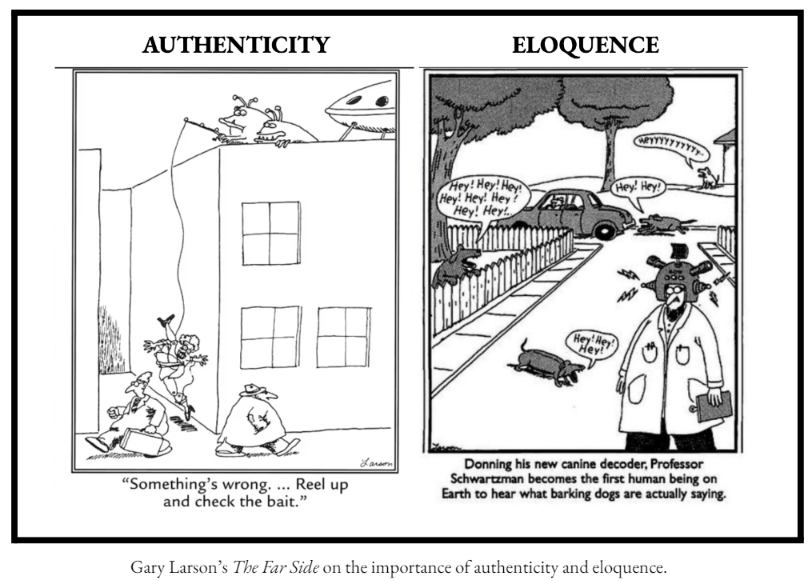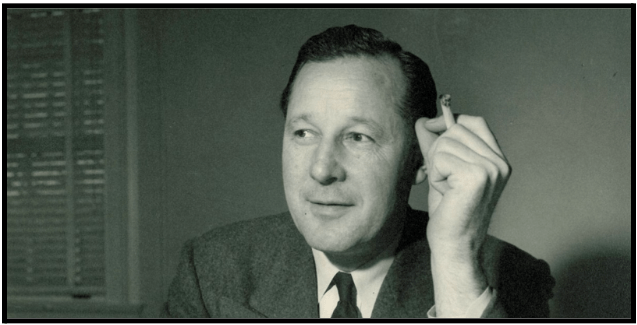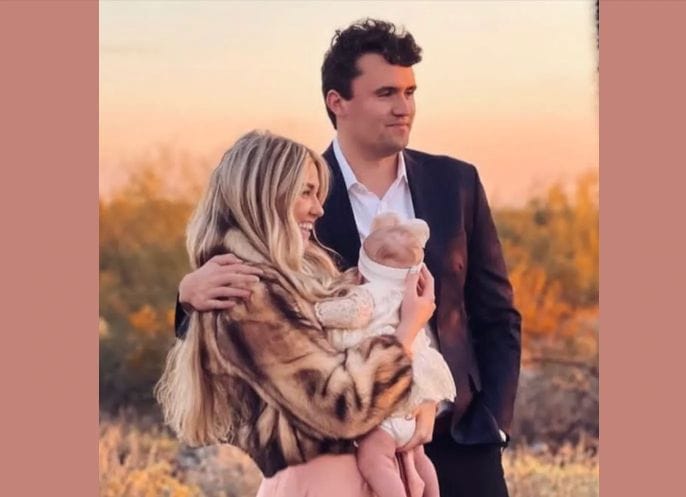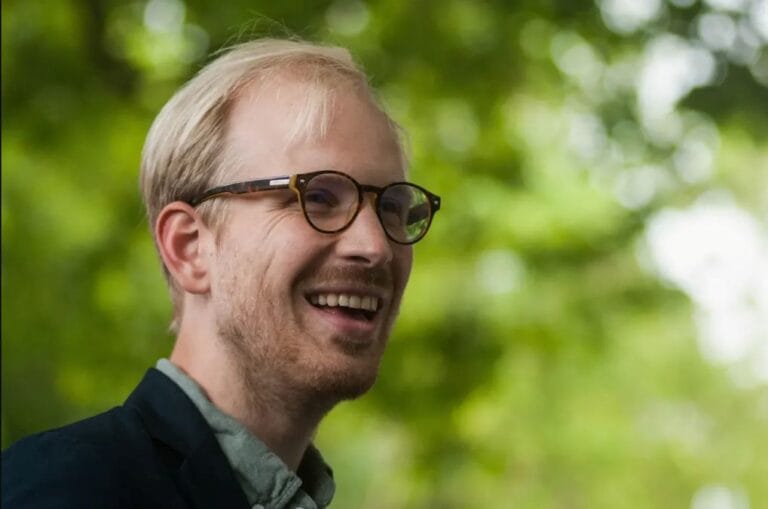Authenticity often competes with eloquence. Combine them by crossing the Uncanny Valley.
Talking Big Ideas.
“Forge ahead.”
~ Clint Eastwood
There’s an interesting balance between authenticity and eloquence.
We come across as natural-sounding in our everyday conversations when we’re just being ourselves. But it’s often at the expense of eloquence. Off the cuff, we tend to ramble, bury the lead, leave important details out, and focus on ourselves rather than our audiences.
For important conversations and speeches, it makes sense to put in extra effort to increase our eloquence and correct the problems that occur in casual conversation. Practicing public speaking helps us do this by delivering a clear, audience-focused message with confidence, fluency, and contagious enthusiasm.

The problem is that once we start to increase our eloquence, we tend to lose our authenticity.
An executive who won a prestigious award reached out to me. He had to accept it with a short speech at a conference in front of more than a thousand people. While he’s a solid leader, he’s always hated public speaking and has avoided it at all costs.
“I’m willing to go on stage and be scared,” he told me. “I just really don’t want to be scripted. It’s so dull and robotic. I’d rather go up there and be myself.”
I get it.
We don’t want to listen to speakers who ramble inarticulately, nor do we want to hear those who sound robotic. The philosopher Mortimer Adler complained that robotic speakers are “almost impossible to listen to and seldom, if ever, deserve the monumental effort” needed to pay attention.
Authenticity is essential. And for certain moments, so is eloquence. We notice when either one is lacking:

What we really want is both authenticity and eloquence.
The ideal is to bring the authenticity of our everyday conversations into our formal remarks, and also to bring the eloquence of our formal remarks into our everyday conversations.
Thankfully, this is possible.
Chris Anderson, the head of the TED conference, explains with a thought experiment. Imagine you watch a friend prepare for a big talk. She decides to put in real effort to practice and internalizes several important passages. Every day, she presents you with the best version she can without using notes.
At first, she sounds natural. But then she transforms into something else.
She sounds awkward, not quite herself. Anderson calls this the Uncanny Valley, borrowing an art term to describe film animations that look too human. The result – creatures that are almost human but not quite – make people uncomfortable.
You may recall the brutal response to the 2019 film Cats. Audiences were creeped out. The characters – not quite human, not quite cats – were stuck in the awkwardness of the Uncanny Valley.
Your friend may sense she’s in the Uncanny Valley of speaking awkwardness and want to abandon her effort. This is a mistake!
Instead of retreating back to her baseline, she should forge ahead. After a few more rounds of practice, Anderson says, something magical will happen:
You will notice a thrilling change. Suddenly [she] really knows the talk . . . so well that recalling it is a snap . . . your friend can use [her] conscious attention to focus on the meaning of the words once again.
The lesson is clear: push through the Uncanny Valley and enjoy the transformational magic of speaking excellence that awaits.
Think about this as working through three phases of speaking:
- BASELINE: Natural & mediocre
- UNCANNY VALLEY: Unnatural & eloquent
- EXCELLENCE: Natural & eloquent
We all begin at our baseline. Once we start to add eloquence, we sound and feel unnatural. But when we have the courage and resilience to press on, we eventually forge ahead through the Uncanny Valley.
Our personality shines. Our ideas become clear, compelling, and contagious. We say exactly what we want without rambles or digressions.
“Nothing in this world can take the place of persistence . . .
The slogan ‘Press On’ has solved and always will solve the problems of the human race.”
~ Calvin Coolidge
Our path in preparing for big talks should be to move to the right of our baseline until we reach excellence:
When the stakes are high, most people don’t stay at their baseline. Either they prepare well enough to be excellent, they prepare not quite enough and end up in the Uncanny Valley, or they don’t prepare at all and regress into the struggle zone.
For high-stakes moments, put in the effort to be excellent. This requires hard work. As the entrepreneur Paul Graham says:
While good thinking may be rare, you can do it.
For high-stakes speeches, it helps to take the time beforehand to really think through your ideas and then clarify them in writing.

I encourage you to write out the key ideas of your important speeches.
I don’t recommend you try to memorize a script, but you should memorize your basic structure, your opening and closing words, and your Big Idea – which is ideally distilled to its essence, like a proverb, and hammered home.
I encourage you to share your stories from the heart, not fully scripted, and leave plenty of space to play jazz with your audience.
The executive that hired us agreed to follow this plan. We practiced together for several weeks after we finalized his remarks. We even ran a few reps on-site the morning of his big talk.
He crushed it. A crowd of people gathered around him afterward. He told me later it was the best speech he’d ever given.
I encourage you to follow his path. When things get scary and awkward, resist the desire to retreat back to your baseline; instead, forge ahead through the Uncanny Valley.
Excellence awaits.




